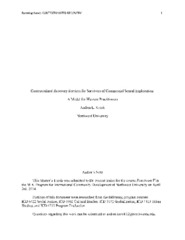Contextualized Recovery Services for Survivors of Commercial Sexual Exploitation: a Model for Western Practitioners
Abstract
For many years, both faith based and secular Western development workers practiced various types of development work in the two-thirds world. Unfortunately, these practices often resulted in unintended harm. Those sometime harmed included survivors of prostitution and sex trafficking. Through comparing a case study of effective aftercare for adult women in Quezon City, the Philippines and a case study of recovery services for adult women in Seattle, WA, I highlighted the differences between the two cultures and the need for Western development workers to use culturally appropriate recovery methods when assisting female survivors of commercial sexual exploitation. I also focused on using Geert Hofstede’s six cultural indices as a measure for explaining cultural differences. I then provided contextualized practices to use with female survivors of commercial sexual exploitation in the two-thirds world. In my recommendations, I included a discussion on understanding: unintended consequences, culture, staff, and clients. I also included a discussion on the importance of using: indigenous terminology, methodologies, cultural brokers, and evaluation.
Original item type
Microsoft Word (DOCX)
Original extent
60 pages
Collections
Copyright
This original work is protected by copyright. Copyright is retained by the author(s). Works may be viewed, downloaded, or printed, but not reproduced or distributed without author(s) permission.


 Maintained by the Northwest University Library
Maintained by the Northwest University Library